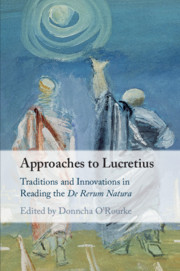Book contents
- Approaches to Lucretius
- Approaches to Lucretius
- Copyright page
- Contents
- Figures
- Notes on Contributors
- Preface
- Abbreviations
- Introduction
- Part I The Text
- Part II Lucretius and his Readers
- Part III The Word and the World
- Part IV Literary and Philosophical Sources
- Part V Worldviews
- Chapter 11 Was Memmius a Good King?
- Chapter 12 A Tribute to a Hero: Marx’s Interpretation of Epicurus in his Dissertation
- Chapter 13 Plato and Lucretius on the Theoretical Subject
- Works Cited
- Index Locorum
- Index Rerum
Chapter 11 - Was Memmius a Good King?
from Part V - Worldviews
Published online by Cambridge University Press: 25 June 2020
- Approaches to Lucretius
- Approaches to Lucretius
- Copyright page
- Contents
- Figures
- Notes on Contributors
- Preface
- Abbreviations
- Introduction
- Part I The Text
- Part II Lucretius and his Readers
- Part III The Word and the World
- Part IV Literary and Philosophical Sources
- Part V Worldviews
- Chapter 11 Was Memmius a Good King?
- Chapter 12 A Tribute to a Hero: Marx’s Interpretation of Epicurus in his Dissertation
- Chapter 13 Plato and Lucretius on the Theoretical Subject
- Works Cited
- Index Locorum
- Index Rerum
Summary
Lucretius’ choice of addressee has engaged a number of critical responses, both historicizing and literary-critical. This chapter assesses what is distinctive about Lucretius’ approach to C. Memmius (taken to be the praetor of 58 BC and unsuccessful consular candidate of 53 BC) through comparison with the theory and practice of Epicureanism in contemporary sources, chiefly Philodemus. In the context of Memmius’ disgrace and exile to Athens, Lucretius’ invectives against ambition and similar vices take on an especially mordant character – a frank criticism that contrasts with Philodemus’ more deferential treatment of C. Calpurnius Piso, especially in On the Good King According to Homer. This difference suggests that Lucretius chose Memmius as his addressee for the very reason that this corrupt and failed Roman politician was far from being a promising disciple and badly in need of Epicurean teaching.
Keywords
Information
- Type
- Chapter
- Information
- Approaches to LucretiusTraditions and Innovations in Reading the <I>De Rerum Natura</I>, pp. 219 - 240Publisher: Cambridge University PressPrint publication year: 2020
Accessibility standard: Unknown
Why this information is here
This section outlines the accessibility features of this content - including support for screen readers, full keyboard navigation and high-contrast display options. This may not be relevant for you.Accessibility Information
- 1
- Cited by
